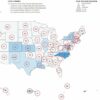Public health interventions that tackle dementia risk factors could yield as much as £4bn ($4.9bn USD) in savings in England by reducing dementia rates and helping people to live longer and healthier, finds a new study led by UCL researchers.
The study, published in The Lancet Healthy Longevity, shows that interventions—such as reformulating food products to reduce sugar and salt intake, introducing low emission zones to improve air quality in cities, and minimum alcohol unit pricing to reduce drinking—could have extensive benefits beyond just the health outcomes they are directly targeting.
Lead author Dr. Naaheed Mukadam (UCL Psychiatry) said, “There is a growing body of research demonstrating that dementia rates could be reduced by targeting risk factors throughout the lifespan. Smoking, drinking, and high blood pressure are among numerous risk factors that increase the likelihood of a person developing dementia later in life, which could be targeted by public health interventions.
“While most of the initiatives we studied are not designed with dementia reduction as an aim, in many cases their impact on dementia risk is so great that they pay for themselves by impact on dementia costs alone, which should be routinely considered as part of cost-benefit evaluations.”
The economic modeling study estimated the impact of population-level interventions on subsequent dementia rates and related costs, including the expected gains to Quality Adjusted Life Years (QALY; equivalent to an additional year of life in perfect health, expressed as a total across the population).
The interventions studied, targeting six risk factors (smoking, alcohol use, obesity, hypertension, head injuries, and air pollution) could yield over 70,000 QALY gains in total.
A separate study co-authored by Dr. Mukadam in 2022 found that a wide range of interventions targeting such risk factors are cost-effective without even considering impact on dementia risk, by reducing the costs of other health outcomes such as hypertension (high blood pressure) or diabetes.
Now in their latest study, the researchers have found such interventions appear to be far more cost-effective when dementia costs are taken into account.
For this paper, the researchers reviewed studies into a range of public health interventions to estimate the impact they would have on reducing dementia rates.
They found that reformulation of food products to reduce salt and sugar intake and therefore reduce dementia risk from obesity and hypertension, respectively, could yield cost savings of £2.4 billion and £1.1 billion, respectively, and QALY gains of 39,433 and 17,985, respectively.
A 10% increase in cigarette prices could save £157 million in dementia costs, while making bicycle helmets compulsory for children could save £91 million by reducing dementia risk many years later.
A previous study led by Dr. Mukadam in 2020 found that individual interventions, such as hearing aids, nicotine gum to quit smoking, or medication to treat high blood pressure, could save £1.9bn annually in England.
The latest study is being published in conjunction with the third Lancet Commission on dementia prevention, intervention, and care, led by Professor Gill Livingston (UCL Psychiatry), which reports that nearly half of dementia cases could be prevented or delayed by targeting 14 risk factors throughout the lifespan.
Professor Livingston, also the senior author on The Lancet Healthy Longevity economic modeling paper, said, “Finding effective treatments for dementia is now a massive challenge for scientists, clinicians and governments, and there are signs of hope, but we also know that we could save many people from ever developing dementia in the first place by targeting risk factors. As our population ages and the societal costs of dementia rise, there is a growing need for public health measures to prevent dementia.”
Dr. Mukadam added, “People can make changes to their lifestyles to reduce their own risk of developing dementia, but we particularly need policy-based approaches that do not place the burden on individuals. While these interventions cost money, they more than pay for themselves over time by reducing later health and social care costs.
“Numerous studies have shown that these interventions may be most impactful in low- and middle-income countries, or in lower-income groups, so we expect they could reduce health inequalities and improve the health of everyone.”
Samantha Benham-Hermetz, Executive Director of Alzheimer’s Research UK, added, “Dementia causes a devastating toll on people, their families and wider society. In the UK the economic costs are staggering—dementia is estimated to cost £42 billion a year. And the cost of dementia on hospitals across England has doubled over the past decade, with 90% of these costs coming from emergency admissions. With an aging population, these costs will only continue to spiral.
“We now know that up to 45% of dementia cases are preventable, and there are cost-effective public health measures available—such as blood pressure checks and bans on smoking—that could reduce the risk of people developing dementia.
“This would alleviate an enormous economic burden on families and wider society. The new government must seize this win-win opportunity—extending healthy life expectancy, while putting public funds to better use.”
More information:
Benefits of population-level interventions for dementia risk factors: an economic modelling study for England, The Lancet Healthy Longevity (2024). DOI: 10.1016/S2666-7568(24)00117-X
Provided by
University College London
Citation:
Public health measures that reduce dementia risk could save up to $5bn, UK study suggests (2024, July 31)



